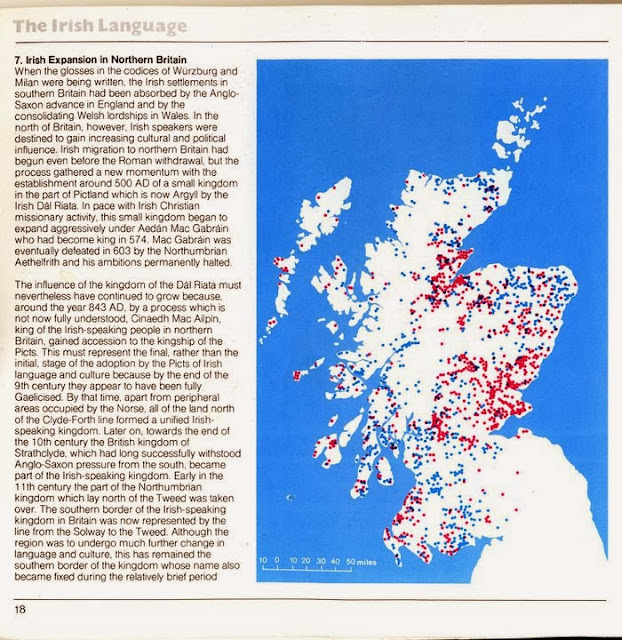The Book of Armagh declares the High King of Ireland, Brian Boru to be “Imperator Scottorum” or “Emperor of the Irish”. Ireland was named by the Romans “Scotia” and its people Scoti. The invasion of Irish tribes of northern Britain led it acquiring the name “Scotland” or land of the Irish.
A 9th century philosophiser working on the continent writes his name as Johannes Scotus Eriugena - John the Irishman born in Ireland (Ériu-gena/born) as opposed to Scotland. Almost three centuries before Isadore of Seville wrote that Ireland and Scotland were the same country. Later the lands were distinguished as Scotia Major (Ireland) and Scotia Minor (Scotland). Hibernia is also a Roman term for the Island of Ireland and can be translated as “the land of eternal winter” or “wintry”. It is sometimes claimed that the name Hibernia derives from the ancient Greek name for the island Iouernía an alteration of the Q-Celtic name Iweriu. A variant Ierne was also used; Claudian 395 AD says “When the Scots put all Ireland in motion (against the Romans), then over heaps of Scots the Icy Ierne wept”. In other words many Irish were killed when they attacked the Romans in Britain. In 391 AD a Roman Consul, Quintus Aurelius Symmachus received a present of seven "canes Scotici" or Irish wolfhounds.
An article on the author Thomas Dempster (1579-1625) in the Dictionary of National Biography remarks of his book that it 'is chiefly remarkable for its extraordinary dishonesty', claiming as Scots not only almost all Irish men of any renown but also Alcuin, Boniface and even Boadicea.
Thomas Dempster's fraudulent claims are illustrative of the confusion caused by the Roman word for an Irish person "a Scot" After the Norman invasion the exonym "Ireland" increased in popularity and the old distinction between Scotia major (Ireland) and Scotia minor (Scotland) was lost and many a poor scholar since have assumed erroneously that Scot means a person from Scotland! The confusion allowed the Scots to steal much of Irish history and claim it as their own.
Even the pope was a victim of the Scottish whitewash when in 1577 he handed over control of Regensburg, Schottenkloster, the oldest and most illustrious of the Irish foundations in Germany to Scottish monks on the grounds that it had been an originally a Scottish foundation which had been subsequently taken over by the Irish. The Scot element in Schottenkloster no doubt influenced his decision.
Ireland, the Land of Saints and Scholars sent so many missions to the continent that people there held the term "scottus" as synonymous with 'saint'. All those meanings are now lost to all but astute students of history and followers of Irish Medieval History on Facebook!
An Irish man, a saint and a scholar known to history as St. Donatus of Fiesole (Italy) wrote a poem about his homeland in the 9th century. Note Scotland was never and Island!
Far westward lies an isle of ancient fame,
By nature bless'd; and Scotia is her name,
Enroll'd in books: exhaustless is her store,
Of veiny silver, and of golden ore.
Her fruitful soil, for ever teems with wealth,
With gems her waters, and her air with health;
Her verdant fields with milk and honey flow;
Her woolly fleeces vie with virgin snow;
Her waving furrows float with bearded corn;
And arms and arts her envied sons adorn!
No savage bear, with lawless fury roves,
Nor fiercer lion, through her peaceful groves;
No poison there infects, no scaly snake
Creeps through the grass, nor frog annoys the lake;
An island worthy of its pious race,
In war triumphant, and unmatch'd in peace!
Image: distribution map of Irish place names in Scotland.
